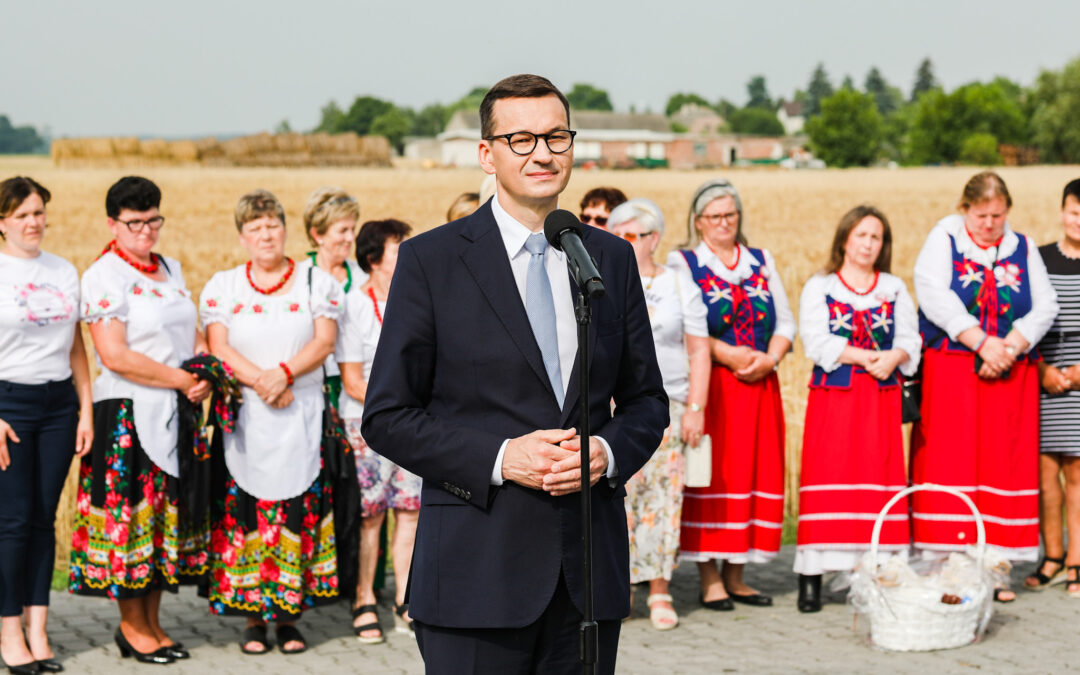The government is seeking to boost turnout in rural areas at Sunday’s elections by offering 250,000 zloty (€55,000) payouts for country housewives’ associations, brass bands and local sports clubs in small municipalities where more than 60% of voters cast their ballot.
The programme, announced by the agriculture ministry yesterday, is seen by commentators as another attempt by the ruling Law and Justice (PiS) party to increase its vote by offering incentives in areas where it traditionally has stronger support.
A separate, similar scheme was launched last month through which the government will reward small municipalities which have the highest turnout with prizes of up to one million zloty (€220,000) to modernise their fire stations.
As in past elections, PiS using state funds to boost turnout where it has most support, through cash "bonus" program of rewards (from agriculture ministry) for districts of up to 20,000 inhabitants with highest turnout in region. In 2019, PiS won 53% of vote in such districts. https://t.co/Aj8nWgvUgA
— Stanley Bill (@StanleySBill) October 12, 2023
The government, however, argues that such programmes are a pro-democratic attempt to support turnout in places where a smaller proportion of voters have typically voted in the past.
In the last parliamentary elections in 2019, small municipalities had an average turnout of 54% to 60%, compared to 73% in cities with over 500,000 residents. PiS’s share of the vote in smaller municipalities was between 48% and 58%, while in large cities it was just 30%.
“I would like rural areas, the smaller ones, which are usually underrepresented in elections, less likely to go to the polls because the polling station is further away, to have this energy to push all people to the polls,” said Prime Minister Mateusz Morawiecki yesterday, quoted by the Polish Press Agency (PAP).
The president has approved changes to the electoral code that increase the number of polling stations and provide free transport for elderly voters.
The opposition claims the move is intended to increase turnout among groups that support the ruling party https://t.co/FiFSypzy2j
— Notes from Poland 🇵🇱 (@notesfrompoland) March 14, 2023
The scheme, which is only available to municipalities with up to 20,000 inhabitants, would provide funding of 250,000 zloty for local koła gospodyń wiejskich (a type of women’s club common in rural areas, usually translated as “country housewives association”) and brass bands in districts with turnout over 60%.
Morawiecki argued that the activities run by the housewives – who often “work three jobs”, that is, their normal job, their housework and their work for the local community – are essential as they “awaken that spirit of Polishness, the spirit of patriotism”.
Poland has over 12,700 such rural housewives’ clubs. Between 2018 and 2022, the prime minister’s office allocated 197.5 million zloty (€43.4 million) to support them and has given 120 million zloty so far this year.
Meanwhile, under the newly announced programme, an additional 250,000 zloty will go to a local sports club in small municipalities with turnout over 60%. The districts with the highest turnout in an area will receive grants of 1 million zloty.
The women of a village in Poland took matters into their own hands – literally – by paving all of its footpaths themselves after the authorities had failed to do so https://t.co/DnGFQXU0ml
— Notes from Poland 🇵🇱 (@notesfrompoland) August 14, 2023
As with the scheme announced last month to renovate fire stations in rural areas with high turnout – as well as a similar programme during the 2020 presidential elections to provide new fire trucks to such districts – commentators see the latest announcement as an attempt by PiS to boost its vote.
“Previously fire trucks, now fire stations and then this,” tweeted Tomasz Żółciak, a journalist at the Dziennik Gazeta Prawna daily. “If this continues, someone will come up with the idea of paying targeted voters to vote.”
“PiS is using government reserves to attempt to bribe people to turn out in small communes, where it tends to perform best,” wrote Ben Stanley, a political scientist at SWPS University in Warsaw.
The government has also faced accusations of seeking to boost turnout among its own supporters by changing the electoral code to increase the number of polling stations in rural areas and to require local authorities to provide free transport to elderly people – who are more likely to vote for PiS – on election day.

Notes from Poland is run by a small editorial team and published by an independent, non-profit foundation that is funded through donations from our readers. We cannot do what we do without your support.
Main image credit: KPRM (under CC BY-NC-ND 3.0 PL)

Alicja Ptak is deputy editor-in-chief of Notes from Poland and a multimedia journalist. She has written for Clean Energy Wire and The Times, and she hosts her own podcast, The Warsaw Wire, on Poland’s economy and energy sector. She previously worked for Reuters.



















